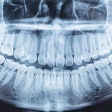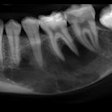Dental patients can safely continue on aspirin for minor surgery such as single extractions, a new study suggests. The research supports a practice that is already common among many dentists, some of whom are also successfully keeping patients on stronger anticoagulants such as warfarin (Coumadin) and clopidogrel (Plavix).
The randomized controlled trial, published in the Journal of Dental Research (August 2008, Vol. 87:8, pp. 740-744), found that patients who discontinued aspirin prior to having a tooth pulled did not bleed significantly longer than patients who continued an aspirin regimen.
"From this study you can say that there is no reason for patients to go off aspirin for a single tooth extraction or a similarly invasive procedure," said Michael T. Brennan, D.D.S., M.H.S., associate chair of oral medicine at the Carolinas Medical Center in Charlotte, NC.
"There is a definite risk of going off aspirin if you're using it as an anticoagulant," he said. "There can be worse coronary outcomes."
Dentistry has been divided on this issue, Dr. Brennan said. "There has been more and more movement to stay on aspirin," he said. "But in general, dental schools are recommending to go off it."
To see which camp was right, Dr. Brennan and his colleagues randomly split a group of patients needing an extraction into two groups. Seventeen patients received a placebo and 19 got aspirin, for two days prior and two days after the extraction.
As expected, the aspirin group scored much lower in whole-blood aggregation tests. But the researchers found no sign of any difference in bleeding between the two groups. The observers watched the extraction site for two minutes, then blotted with gauze. They recorded as a positive test any bleeding that ran over the crest of the socket, repeating the observation at intervals of 5, 8, 11, 14, and 20 minutes. There was no significant difference.
The researchers also phoned the participants at 3-7 hours and again at 40-55 hours after each extraction to ask how long they had continued bleeding. Once again the responses were statistically equivalent.
In his own practice, Dr. Brennan said he doesn't hold aspirin even for a full-mouth extraction. "I never discontinue aspirin," he said.
The results came as no surprise to Daniel M. Laskin, D.D.S., M.S., professor and chairman emeritus of oral and maxillofacial surgery at Virginia Commonwealth University in Richmond. "I think clinically we have known that for a long time," he said. "But this is sort of proof."
Bleeding is particularly easy to control after an extraction. "You can pack it and you can suture it," Dr. Laskin said. "It's different from other types of surgery."
While many dentists know this already, Dr. Laskin said, a lot of medical doctors don't, so it pays to talk to the patient's physician before the procedure.
That's especially true if the patient is taking a stronger anticoagulant such as warfarin or clopidogrel. Many dentists are keeping their patients on these medications during minor surgery as well, for fear of stroke or other cardiovascular events.
For warfarin, dentists can safely go ahead with an extraction if they test the patient's international normalized ratio (INR) on the day of the surgery and find that it is 2.5 or less, Dr. Laskin said. If the patient is taking clopidogrel, a conversation with the medical doctor is especially important because its effects can't be measured by the INR.
Doctors have reason to be cautious about bleeding, said Eric Carlson, D.M.D., M.D., chair of the department of oral and maxillofacial surgery at the University of Tennessee, Knoxville. "It only takes one bleeding episode -- where the patient is home and has to come back to the hospital -- to change your thinking," he said.
He agreed that dentists could keep patients on anticoagulants for minor surgery, but not for major surgery such as he often does on patients' necks. (In contrast to Dr. Laskin, Dr. Carlson suggested a minimum INR of 2.0 for warfarin.)
What's the border between major and minor? In general, minor surgery is done fairly quickly in the office, he said. Major surgery is anything that requires an operating room, general anesthesia, and several hours. For these procedures, he holds all anticoagulants, including aspirin.
"It all depends on what surgical procedure is going to be done," he said.















